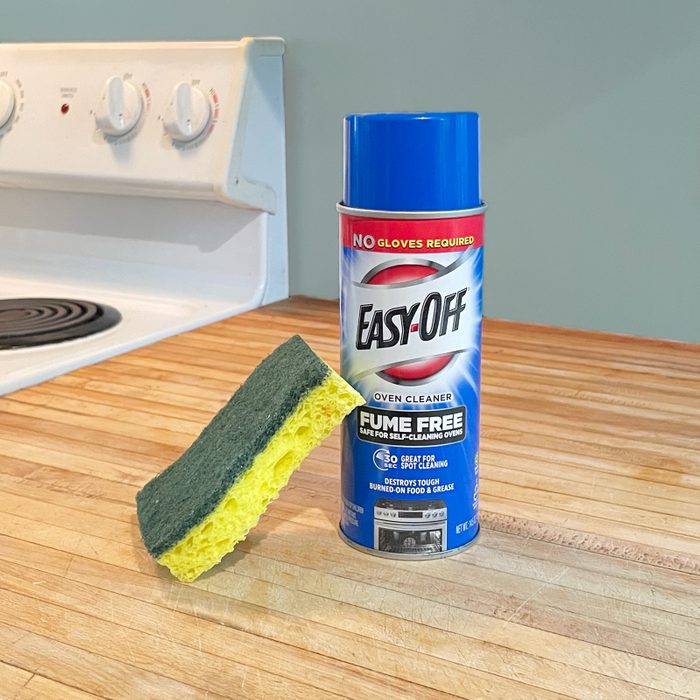Oven cleaner can damage kitchen countertops, causing discoloration and deterioration of the surface. It is important to be cautious when using oven cleaner on countertops to avoid any potential damage.
While oven cleaner is effective in removing tough stains and grease, it contains strong chemicals that can be harmful to certain countertop materials such as granite, marble, or laminate. Before using oven cleaner, it is advisable to spot test on a small, inconspicuous area to ensure it does not cause any damage.
It is recommended to read the manufacturer’s instructions carefully and use safe alternative cleaning methods for kitchen countertops to preserve their appearance and longevity.

Credit: www.familyhandyman.com
Types Of Kitchen Countertops
When using oven cleaner on kitchen countertops, it’s essential to consider the materials’ reactions. Natural stone, such as granite, marble, or slate, may be sensitive to harsh chemicals and abrasives, causing irreversible damage. Solid surface and quartz countertops are more resilient to oven cleaners but can still be affected by persistent exposure. Laminate countertops are the most vulnerable as they can be damaged by strong chemicals and should be cleaned with mild agents. Overall, it’s crucial to choose cleaning agents that are suitable for your specific countertop material to avoid any potential harm.
Understanding Oven Cleaner
Oven cleaner can have different effects on kitchen countertops depending on the material. Some cleaners may cause discoloration or damage to certain surfaces, so it is important to choose the right product for your countertops. Conduct thorough research and read the manufacturer’s recommendations to ensure safe and effective cleaning.
| Oven Cleaner Components | How Oven Cleaner Works |
| Alkaline chemicals like sodium hydroxide | Breaks down grease and grime |
| Solvents like ethylene glycol monobutyl ether | Dissolves tough stains |
| Surfactants like sodium laureth sulfate | Helps to lift dirt easily |
Potential Effects Of Oven Cleaner On Countertops
Using oven cleaner on kitchen countertops may lead to chemical reactions. These reactions can cause stains. Discoloration and damage to the surface are also common issues. It’s important to be cautious when using oven cleaner on countertops and follow manufacturer’s instructions carefully.

Credit: geologydegree.org
Protecting Kitchen Countertops From Oven Cleaner
Oven cleaner can have detrimental effects on various types of kitchen countertops, so it’s crucial to take preventive measures to protect them. Ensure that the countertops are properly sealed and regularly maintained to create a protective barrier against oven cleaner. Additionally, consider using safe alternatives such as mild detergent or baking soda to clean countertops instead of harsh chemical cleaners. It is important to test any new cleaning products on a small, inconspicuous area of the countertop before using them extensively to ensure it doesn’t cause any damage.
Cleaning And Maintenance Tips For Countertops
Regular cleaning and maintenance of your kitchen countertops is essential to keep them looking pristine and extend their longevity. However, it’s important to be cautious about the products you use, especially when it comes to oven cleaners. Harsh chemicals found in these cleaners can potentially cause damage to your countertops.
Instead of using harsh chemicals, opt for gentle and natural cleaning solutions. For everyday cleaning, a mild soap or dish detergent diluted in warm water works well. Avoid abrasive sponges or scrub brushes as they can scratch the surface. Instead, use a soft cloth or sponge for gentle cleaning.
To remove stubborn stains or grease buildup, you can make your own natural cleaning solution by mixing vinegar and water. Vinegar’s acidity helps to break down grease and stains, making it an effective option. Just remember to rinse thoroughly with water and dry the surface afterwards.
Additionally, it’s important to regularly seal your countertops to protect them from stains and spills. Follow the manufacturer’s recommendations for the appropriate sealant and application frequency.

Credit: knbcabinet.com
Frequently Asked Questions On What Is The Effect Of Oven Cleaner On Kitchen Countertops
Can Oven Cleaner Damage Kitchen Countertops?
Yes, oven cleaner can damage kitchen countertops if not used correctly or if the countertop material is not compatible.
Which Type Of Countertops Can Be Affected By Oven Cleaner?
Oven cleaner can affect countertops made of materials such as granite, marble, laminate, wood, and some types of painted or coated surfaces.
How Should I Protect My Kitchen Countertops While Using Oven Cleaner?
To protect your kitchen countertops, you should cover them with a protective layer like plastic or a non-reactive material before using oven cleaner.
What Should I Do If Oven Cleaner Accidentally Spills On My Countertops?
If oven cleaner spills on your countertops, immediately wipe it off with a damp cloth and clean the area with mild soap and water.
Are There Any Alternative Cleaning Methods For Kitchen Countertops?
Yes, there are alternative cleaning methods for kitchen countertops such as using vinegar and water solutions, baking soda paste, or purchasing countertop-specific cleaners.
Conclusion
Understanding the impact of oven cleaner on kitchen countertops is crucial. It’s important to choose a gentle, non-abrasive cleaner to maintain the integrity and appearance of your countertops. Prioritize regular cleaning and proper maintenance to uphold the longevity and aesthetics of your kitchen surfaces, avoiding costly repairs down the line.
